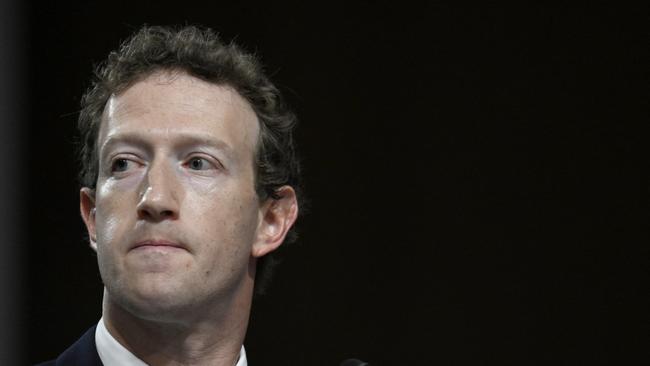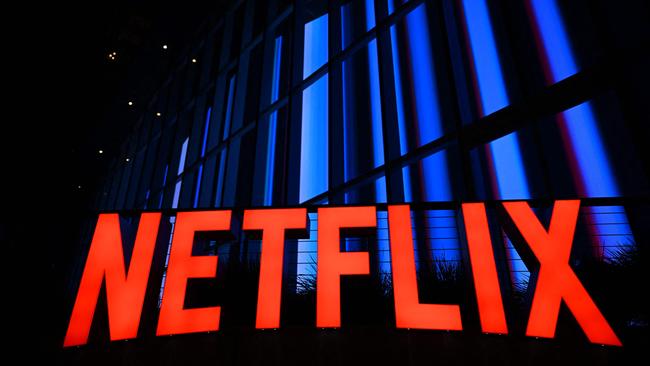Meta denies sharing Facebook users’ messages with Netflix in latest claim of mishandling data
The social media giant allegedly had a ‘special relationship’ with Netflix, with US court documents claiming the partnership let the streamer access Facebook users’ direct messages.

Meta has denied it allowed Netflix access to Facebook users’ direct messages – an accusation made in unsealed court documents – as “shockingly untrue” as it faces fresh allegations of mishandling user data.
The claims come two years after Meta agreed to pay $US725m ($1.1bn) to settle a data privacy class action over the Cambridge Analytica scandal, which involved data belonging to millions of Facebook users being harvested without their consent.
In court documents – unsealed last week as part of an antitrust lawsuit filed by US citizens Maximilian Klein and Sarah Grabert – Meta was accused of allowing Netflix access to Facebook users’ direct messages for almost a decade, saying the two companies enjoyed a “special relationship”.
The documents state that an inbox API agreement allowed Netflix “programmatic access to Facebook’s user’s private message boxes”.
“In exchange for which Netflix would “provide to FB a written report every two weeks that shows daily counts of recommendation sends and recipient clicks by interface, initiation surface, and/or implementation variant,” the documents state.
“Facebook provided Netflix with access to its so-called “Titan API,” a private API that allowed a whitelisted partner to access, among other things, Facebook user’s “messaging app and non-app friends.”

Meta communications director Andy Stone said while the company had an agreement with Netflix, he rejected the allegations it allowed the streaming giant to peer into its users’ messages.
“Shockingly untrue. Meta didn’t share people’s private messages with Netflix,” Mr Stone wrote on X, formerly known as Twitter.
“The agreement allowed people to message their friends on Facebook about what they were watching on Netflix, directly from the Netflix app. Such agreements are commonplace in the industry.
It comes as the Mark Zuckerberg-led company has faced strong criticism from several regulators – including Australia’s competition watchdog – over the proliferation of scams on its platforms, as well as from political leaders and child protection experts who allege the company is “encouraging and reinforcing” youth crime.
At the same time, it has turned off its news tab after walking away from content deals with Australian media companies worth about $70m a year, sparking fears Facebook and its other platforms will become a hotbed of misinformation.

It is not the first time Meta has been forced to deny allegations that it shared user messages with third parties.
Six years ago, the company said it gave its “partners” read/write/delete messaging access so Facebook users could share with their friends what they were watching on Netflix or listening to on Spotify – but did not disclose those messages.
“We’ve been accused of disclosing people’s private messages to partners without their knowledge. That’s not true,” Meta vice president of product Ime Archibong wrote in a blog post in 2018.
“We worked closely with four partners to integrate messaging capabilities into their products so people could message their Facebook friends — but only if they chose to use Facebook Login. These experiences are common in our industry.
“In order for you to write a message to a Facebook friend from within Spotify, for instance, we needed to give Spotify “write access.” For you to be able to read messages back, we needed Spotify to have “read access.” “Delete access” meant that if you deleted a message from within Spotify, it would also delete from Facebook. No third party was reading your private messages, or writing messages to your friends without your permission.”
In December 2022, Meta settled what was believed to be the biggest privacy class action settlement over the Cambridge Analytica scandal, although it did not admit to wrongdoing.
Cambridge Analytica, a London-based political consulting firm, allegedly used Facebook in an attempt to influence the outcome of the 2016 US presidential election and Britain’s European Union referendum by using the personal data of millions of people.
The class action in the US was said to relate to up to 280 million people. The scandal came to light in 2018, when it was found that the now-defunct firm had worked for Republican Donald Trump’s 2016 presidential campaign and had used personal information from millions of American Facebook accounts for the purposes of voter profiling and targeting.
In 2019, Facebook agreed to pay $US5bn to resolve an investigation into its privacy practices by the US Federal Trade Commission (FTC) and also has paid $US100m to US financial regulators to settle claims it misled investors about the misuse of users’ data.
Separately – at the weekend Australian time – Meta asked a judge to dismiss a different antitrust case from the FTC, relating to monopoly concerns.
The FTC is seeking to “unwind” its takeovers of Instagram and WhatsApp, which it acquired for $US1bn and $US19bn respectively in 2012 and 2014.
“The FTC’s message in this case is clear: no deal is ever truly final, and businesses can be punished for innovating to give people greater value and choice,” Meta chief legal officer Jennifer Newstead said.
“We’ve asked the court to dismiss the case because the FTC has failed to provide evidence to support its claims.
“The evidence shows exactly what we said it would: Meta faces fierce competition from a range of platforms – from TikTok and X to YouTube and Snapchat. Further, Meta’s acquisitions of Instagram and WhatsApp, which regulators reviewed and cleared more than a decade ago.“




To join the conversation, please log in. Don't have an account? Register
Join the conversation, you are commenting as Logout